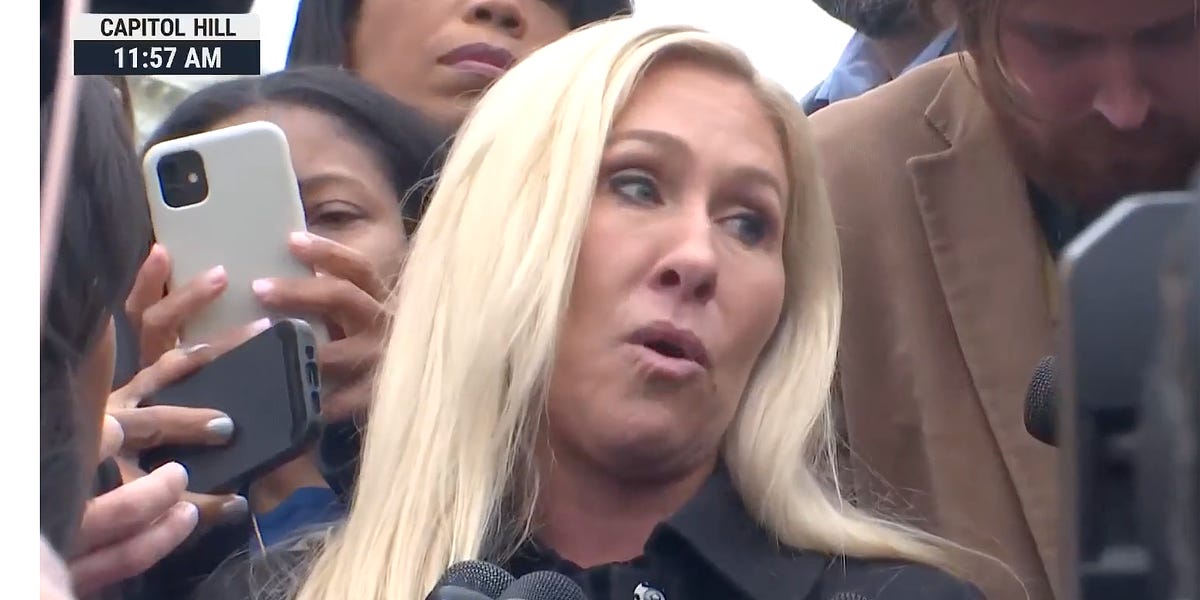"Don't join NATO! Don't you DARE!"
Well then, why else is Russia in Ukraine ?
I mean yeah Russians are paranoid about Fascists ... but really you think this is all about that ?
There was no problem until the recent push to draw Ukraine into NATO / European Union
My .02 Western Interests have been using Ukraine for some shady practices for years ... look at the leak of CIA Sites and Operations, the Bio Labs we denied were present, until they were exposed.
Ukraine is corrupt, laws are lax, the Government can be paid to look the other way while unethical shite goes on, close enough to Europe to setup sites in Ukraine, but outside Western or EU Regulations and Oversite.
The head of the CIA was on a plane flying to Ukraine when the previous guy was pushed out.
1. Russia wants a guarantee Ukraine can never join NATO
Russia's main demand is a commitment from NATO to end its further expansion into former Soviet republics — especially Ukraine. Russia wants NATO to rescind a 2008 promise that Ukraine could someday join the defense alliance. Many observers see it as a distant prospect that Ukraine could join NATO because it doesn't meet membership requirements. But Moscow doesn't see it that way. "We don't trust the other side," Russia's chief negotiator, Deputy Foreign Minister Sergei Ryabkov, said after bilateral talks with the U.S. finished. "We need ironclad, waterproof, bulletproof, legally binding guarantees. Not assurances. Not safeguards. Guarantees. With all the words — 'shall, must' — everything that should be put in."
Russia's reasoning:President Vladimir Putin views Ukraine as an extension of what he calls "historical Russia" — a part of the Russian Empire and Soviet Union, and within Moscow's "sphere of influence" today. The threat of Ukraine's westward turn after a street revolution ousted the country's pro-Russian president in 2014 was the driving force behind Russia's annexation of Crimea later that year. Ukraine's desire to join the Western alliance also led to Russia's sponsorship of separatists in the country's eastern Donbas region — in effect sabotaging its path to membership by fueling a civil war.
NATO's counter: The U.S. argues that countries have a right to choose their own alliances and NATO has a long-standing "
open door policy" for potential membership. "NATO has never expanded through force or coercion or subversion. It is countries' sovereign choice to choose to come to NATO and say they want to join," Deputy Secretary of State Wendy Sherman said after a meeting between Russian and NATO officials in Brussels earlier this month. Russia's actions are making the idea of NATO membership more appealing to Ukrainians, according to
opinion polls. It is unlikely, however, that Ukraine will meet the requirements anytime soon.
Loading...
2. Russia wants NATO arms out of Eastern Europe
The
draft proposals on security that Russia sent to Western powers in December would ban NATO from deploying its weapons and forces in countries in Central and Eastern Europe that joined the alliance after 1997. In effect, that would downgrade membership for Estonia, Latvia, Lithuania, Poland, Czech Republic, Slovakia, Hungary, Romania, Slovenia, Croatia, Montenegro, Albania, North Macedonia and Bulgaria to symbolic status at best.
Russia's reasoning: Moscow sees NATO's addition of former communist countries in Eastern and Central Europe beginning in 1997 as violating a core promise by the United States when the Soviet army peacefully withdrew from Eastern Europe after the fall of the Berlin Wall. In Putin's view, the West took advantage of Russian weakness in expanding the alliance over multiple Russian objections. "And where is it written down on paper?" recalled Putin in recounting NATO's decisions to expand eastward in subsequent years. "They would say to us. 'It's not on paper? Well then get lost along with your concerns.' And that's the way it's been year after year." Now Putin appears to be acting as if Russia is in a position to dictate new terms — and rewrite the story of the end of the Cold War.
NATO's counter: U.S. officials have made clear they believe even Russia knows this demand is unrealistic. Acceding to Russia's proposal would mean redrawing the map of Europe after the Cold War and placing Moscow's security demands above the concerns of whole swaths of Europe that were once under Russian Soviet control. Western officials also contest the idea the alliance promised not to expand and say it was Russian actions that led NATO to beef up deployments in the new member states. "NATO never even had any forces on its eastern edge because we didn't feel the need to have troops close to Russia until Russia invaded Ukraine in 2014 and led NATO members to be concerned that they might keep going into NATO territory," Victoria Nuland, undersecretary of state for political affairs,
said.
What is the source of Russia’s dispute with NATO?
Russian leaders have long been wary of the eastward expansion of NATO, particularly as the alliance opened its doors to former Warsaw Pact states and ex-Soviet republics in the late 1990s (the Czech Republic, Hungary, and Poland) and early 2000s (Bulgaria, Estonia, Latvia, Lithuania, Romania, Slovakia, and Slovenia). Their fears grew in the late 2000s as the alliance stated its intent to admit Georgia and Ukraine at an unspecified point in the future.
For the Kremlin, the notion that Ukraine, a pillar of the Soviet Union with strong historic ties to Russia, would join NATO was a red line. “No Russian leader could stand idly by in the face of steps toward NATO membership for Ukraine. That would be a hostile act toward Russia,” Putin warned U.S. Undersecretary for Political Affairs William J. Burns, who is now director of the CIA, in the weeks leading up to NATO’s 2008 Bucharest Summit.
Although NATO did not announce a formal membership plan for Ukraine and Georgia at the Bucharest Summit, the
alliance did affirm “that these countries will become members of NATO,” and it extended formal invitations to accession talks to Albania and Croatia, which became members in 2009. NATO expanded again in 2017, admitting Montenegro, and in 2020, welcoming North Macedonia.
Did the United States promise the Soviet Union that it would freeze NATO expansion?
Russian officials say that the U.S. government made a pledge to Soviet leaders not to expand the alliance’s eastern borders, a commitment they say came during the flurry of diplomacy following the fall of the Berlin Wall in 1989 and surrounding the reunification of Germany in 1990.
Proponents of this narrative often cite the words that U.S. Secretary of State James A. Baker said to Soviet leader Mikhail Gorbachev in February 1990, that “there would be no extension of NATO’s jurisdiction for forces of NATO one inch to the east.” They say the United States and NATO have repeatedly betrayed this verbal commitment in the decades since, taking advantage of Russia’s tumultuous post-Soviet period and expanding the Western alliance several times, all the way to Russia’s doorstep in the case of the Baltic states.
How did NATO feature in diplomacy between U.S. and post-Soviet Russian leaders?
Some experts point to another pivotal moment to help explain the mistrust between Russia and NATO today: the 1993–94 discussions between the Bill Clinton administration and the Russian government led by Boris Yeltsin.
By this point, the Warsaw Pact and Soviet Union had collapsed, and the Clinton administration was seeking to craft a new security architecture in Europe that would help foster and fortify the continent’s fledging, post-Soviet democracies, including Russia. Some in the Clinton government, as well as Central European countries such as the Czech Republic and Poland, wanted to move quickly and start expanding NATO’s membership eastward. However,
most Clinton officials reportedly did not, being wary that expansion would rankle Russian leaders at a fragile, transitional moment and detract from other U.S. foreign policy objectives, such as nuclear arms control.
Instead, Clinton chose to develop a new NATO initiative called the
Partnership for Peace (PfP), which would be nonexclusive and open to all former Warsaw Pact members, as well as non-European countries. Seeing this non-membership framework as a compromise of sorts, in October 1993, U.S. diplomats proposed it to Yeltsin, who eagerly accepted. (Just days before, Yeltsin, with the Russian military’s support,
forcefully put down an attempt by parliament to oust him.) NATO launched PfP at its annual summit in January 1994, and more than two dozen countries, including Georgia, Russia, and Ukraine, joined in the following months.
However, Clinton soon began speaking publicly [PDF] about expanding NATO’s membership, saying in Prague just days after the launch of PfP that “the question is no longer whether NATO will take on new members but when and how.” Yeltsin warned Western leaders at a conference in December of that year that “Europe, even before it has managed to shrug off the legacy of the Cold War, is risking encumbering itself with a cold peace.”
Clinton subsequently made efforts to allay Yeltsin’s concerns: pushing off enlargement until after the Russian leader was reelected in 1996, inviting Russia to join the Group of Seven, and establishing a formal, non-adversarial forum for Russia-NATO diplomacy. But analysts say that NATO’s expansion in the ensuing years would leave deep scars on the Russian psyche. “For many Russians, most importantly Vladimir Putin, the 1990s were a decade of humiliation, as the United States imposed its vision of order on Europe (including in Kosovo in 1999) while the Russians could do nothing but stand by and watch,” James Goldgeier, an expert on NATO-Russia relations, wrote for War on the Rocks.
The Russian government, led by Putin, continued to be wary of NATO expansion in the 2000s. Putin
expressed doubts that the alliance, which grew its fastest in 2004, would be effective in tackling the security challenges of the day, including international terrorism and the conflict in Afghanistan. Many new members, particularly the Baltic countries, saw NATO membership as a shield against their former Soviet rulers.
In the years that followed, Putin grew increasingly outspoken in his displeasure at NATO’s inroads into Eastern Europe, saying at a
high-profile speech in Munich in 2007 that “it is obvious that NATO expansion does not have any relation with the modernization of the alliance itself or with ensuring security in Europe. On the contrary, it represents a serious provocation that reduces the level of mutual trust.” In the summer following NATO’s 2008 Bucharest Summit, where NATO stated its intent to admit Georgia and Ukraine, Russia invaded the former. Six years later, as Kyiv stepped closer to an economic partnership with another Western bloc, the European Union, Russia invaded Ukraine and annexed Crimea.












